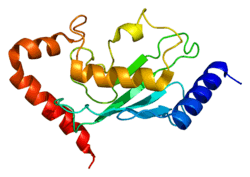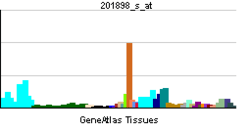UBE2A
| View/Edit Human | View/Edit Mouse |
Ubiquitin-conjugating enzyme E2 A is a protein that in humans is encoded by the UBE2A gene.[3][4]
The modification of proteins with ubiquitin is an important cellular mechanism for targeting abnormal or short-lived proteins for degradation. Ubiquitination involves at least three classes of enzymes: ubiquitin-activating enzymes, or E1s, ubiquitin-conjugating enzymes, or E2s, and ubiquitin-protein ligases, or E3s. This gene encodes a member of the E2 ubiquitin-conjugating enzyme family. This enzyme is required for post-replicative DNA damage repair. Multiple alternatively spliced transcript variants have been found for this gene and they encode distinct isoforms.[4]
Interactions
UBE2A has been shown to interact with RAD18[5][6] and P53.[7]
References
- ↑ "Human PubMed Reference:".
- ↑ "Mouse PubMed Reference:".
- ↑ Koken MH, Smit EM, Jaspers-Dekker I, Oostra BA, Hagemeijer A, Bootsma D, Hoeijmakers JH (May 1992). "Localization of two human homologs, HHR6A and HHR6B, of the yeast DNA repair gene RAD6 to chromosomes Xq24-q25 and 5q23-q31". Genomics. 12 (3): 447–53. doi:10.1016/0888-7543(92)90433-S. PMID 1559696.
- 1 2 "Entrez Gene: UBE2A ubiquitin-conjugating enzyme E2A (RAD6 homolog)".
- ↑ Xin, H; Lin W; Sumanasekera W; Zhang Y; Wu X; Wang Z (July 2000). "The human RAD18 gene product interacts with HHR6A and HHR6B". Nucleic Acids Res. ENGLAND. 28 (14): 2847–54. doi:10.1093/nar/28.14.2847. PMC 102657
 . PMID 10908344.
. PMID 10908344. - ↑ Tateishi, S; Sakuraba Y; Masuyama S; Inoue H; Yamaizumi M (July 2000). "Dysfunction of human Rad18 results in defective postreplication repair and hypersensitivity to multiple mutagens". Proc. Natl. Acad. Sci. U.S.A. UNITED STATES. 97 (14): 7927–32. doi:10.1073/pnas.97.14.7927. ISSN 0027-8424. PMC 16647
 . PMID 10884424.
. PMID 10884424. - ↑ Lyakhovich, Alex; Shekhar Malathy P V (April 2003). "Supramolecular complex formation between Rad6 and proteins of the p53 pathway during DNA damage-induced response". Mol. Cell. Biol. United States. 23 (7): 2463–75. doi:10.1128/MCB.23.7.2463-2475.2003. ISSN 0270-7306. PMC 150718
 . PMID 12640129.
. PMID 12640129.
Further reading
- Koken MH, Reynolds P, Jaspers-Dekker I, et al. (1991). "Structural and functional conservation of two human homologs of the yeast DNA repair gene RAD6.". Proc. Natl. Acad. Sci. U.S.A. 88 (20): 8865–9. doi:10.1073/pnas.88.20.8865. PMC 52611
 . PMID 1717990.
. PMID 1717990. - Kato S, Sekine S, Oh SW, et al. (1995). "Construction of a human full-length cDNA bank.". Gene. 150 (2): 243–50. doi:10.1016/0378-1119(94)90433-2. PMID 7821789.
- Maruyama K, Sugano S (1994). "Oligo-capping: a simple method to replace the cap structure of eukaryotic mRNAs with oligoribonucleotides.". Gene. 138 (1–2): 171–4. doi:10.1016/0378-1119(94)90802-8. PMID 8125298.
- Suzuki Y, Yoshitomo-Nakagawa K, Maruyama K, et al. (1997). "Construction and characterization of a full length-enriched and a 5'-end-enriched cDNA library". Gene. 200 (1–2): 149–56. doi:10.1016/S0378-1119(97)00411-3. PMID 9373149.
- Tateishi S, Sakuraba Y, Masuyama S, et al. (2000). "Dysfunction of human Rad18 results in defective postreplication repair and hypersensitivity to multiple mutagens". Proc. Natl. Acad. Sci. U.S.A. 97 (14): 7927–32. doi:10.1073/pnas.97.14.7927. PMC 16647
 . PMID 10884424.
. PMID 10884424. - Xin H, Lin W, Sumanasekera W, et al. (2000). "The human RAD18 gene product interacts with HHR6A and HHR6B". Nucleic Acids Res. 28 (14): 2847–54. doi:10.1093/nar/28.14.2847. PMC 102657
 . PMID 10908344.
. PMID 10908344. - Miura T, Klaus W, Ross A, et al. (2003). "The NMR structure of the class I human ubiquitin-conjugating enzyme 2b". J. Biomol. NMR. 22 (1): 89–92. doi:10.1023/A:1013807519703. PMID 11885984.
- Shekhar MP, Lyakhovich A, Visscher DW, et al. (2002). "Rad6 overexpression induces multinucleation, centrosome amplification, abnormal mitosis, aneuploidy, and transformation". Cancer Res. 62 (7): 2115–24. PMID 11929833.
- Sarcevic B, Mawson A, Baker RT, Sutherland RL (2002). "Regulation of the ubiquitin-conjugating enzyme hHR6A by CDK-mediated phosphorylation". EMBO J. 21 (8): 2009–18. doi:10.1093/emboj/21.8.2009. PMC 125963
 . PMID 11953320.
. PMID 11953320. - Strausberg RL, Feingold EA, Grouse LH, et al. (2003). "Generation and initial analysis of more than 15,000 full-length human and mouse cDNA sequences". Proc. Natl. Acad. Sci. U.S.A. 99 (26): 16899–903. doi:10.1073/pnas.242603899. PMC 139241
 . PMID 12477932.
. PMID 12477932. - Suzumori N, Burns KH, Yan W, Matzuk MM (2003). "RFPL4 interacts with oocyte proteins of the ubiquitin-proteasome degradation pathway". Proc. Natl. Acad. Sci. U.S.A. 100 (2): 550–5. doi:10.1073/pnas.0234474100. PMC 141033
 . PMID 12525704.
. PMID 12525704. - Lyakhovich A, Shekhar MP (2003). "Supramolecular complex formation between Rad6 and proteins of the p53 pathway during DNA damage-induced response". Mol. Cell. Biol. 23 (7): 2463–75. doi:10.1128/MCB.23.7.2463-2475.2003. PMC 150718
 . PMID 12640129.
. PMID 12640129. - Kunapuli P, Somerville R, Still IH, Cowell JK (2003). "ZNF198 protein, involved in rearrangement in myeloproliferative disease, forms complexes with the DNA repair-associated HHR6A/6B and RAD18 proteins". Oncogene. 22 (22): 3417–23. doi:10.1038/sj.onc.1206408. PMID 12776193.
- Gerhard DS, Wagner L, Feingold EA, et al. (2004). "The status, quality, and expansion of the NIH full-length cDNA project: the Mammalian Gene Collection (MGC)". Genome Res. 14 (10B): 2121–7. doi:10.1101/gr.2596504. PMC 528928
 . PMID 15489334.
. PMID 15489334. - Rual JF, Venkatesan K, Hao T, et al. (2005). "Towards a proteome-scale map of the human protein-protein interaction network". Nature. 437 (7062): 1173–8. doi:10.1038/nature04209. PMID 16189514.
- Nascimento RM, Otto PA, de Brouwer AP, Vianna-Morgante AM (2006). "UBE2A, which encodes a ubiquitin-conjugating enzyme, is mutated in a novel X-linked mental retardation syndrome". Am. J. Hum. Genet. 79 (3): 549–55. doi:10.1086/507047. PMC 1559544
 . PMID 16909393.
. PMID 16909393.
This article is issued from Wikipedia - version of the 6/6/2016. The text is available under the Creative Commons Attribution/Share Alike but additional terms may apply for the media files.





